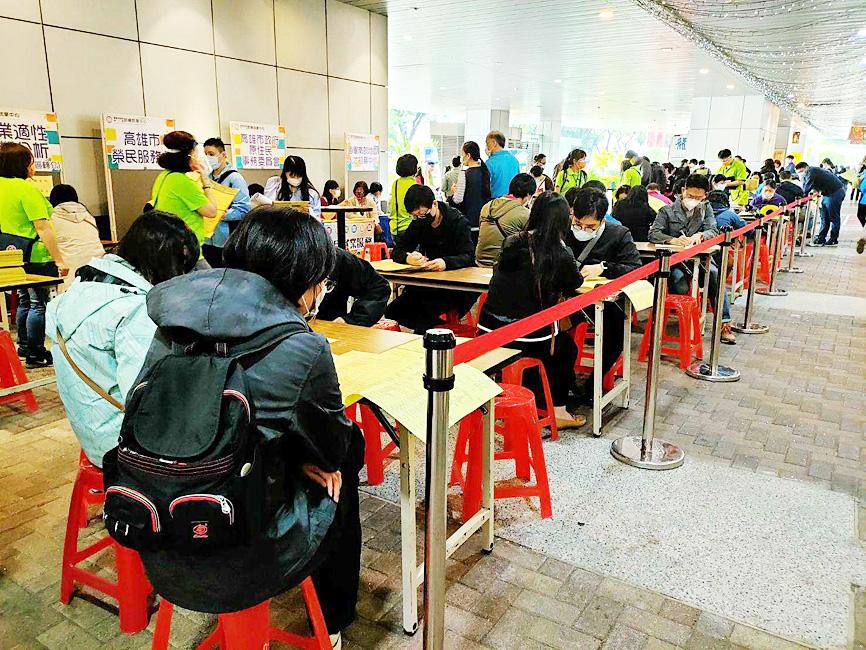A spike in COVID-19 infections appear to have had little impact on the local job market, as the number of job offers reached 1.01 million this month, growing 13 percent from January, a survey by the online 104 Job Bank (104人力銀行) showed yesterday.
The uptrend suggested vibrant hiring activity, as Taiwanese companies are upbeat about business prospects even though domestic cases of the Omicron variant of SARS-CoV-2 have exceeded 1,000 per day for the past few days, the online human resources firm said.
The development came after authorities in Taiwan focused on allowing economic activity to proceed with the least interruption, as more than 99 percent of Omicron patients display mild or no symptoms, the job bank said.

Photo courtesy of Kaohsiung Labor Affairs Bureau
The number of companies with job openings soared 30 percent from 40,000 in January to 52,000 this month, it said.
A breakdown by sector showed electronics, software and semiconductor companies with the most job vacancies at 197,000, followed by 165,000 at hospitality service providers and 147,000 at traditional manufacturers, it said.
By occupation, food and beverage attendants, machinery and equipment operators, as well as business salespeople were in high demand, with vacancies of 130,000, 112,000 and 87,000 respectively, it said.
Taiwan Semiconductor Manufacturing Co (TSMC, 台積電), the world’s largest contract chipmaker whose clients include Apple Inc and Intel Corp, has lowered its recruitment threshold from top-grade university graduates with master’s or doctorate degrees to candidates from all universities and colleges, it said.
To attract and retain talent, TSMC has reportedly offered a 10 percent pay raise for employees this year, IDC said, citing local Chinese-language media.
Similarly, chip designer MediaTek Inc (聯發科) is hiring new engineers whose wages and perks could approach NT$2 million (US$68,423) a year, it said.
However, monthly wages for low-skilled equipment operators and product packagers fall somewhere between NT$31,000 and NT$35,000 at semiconductor manufacturing facilities, the job bank said.
Those willing to work graveyard shifts might earn an extra 30 to 50 percent, it said, but added that relatively few people are willing to work graveyard shifts for health and family reasons.
Hotels, restaurants and entertainment facilities have high turnover rates and are often in need of employees, it found.
Many hospitality facilities have not yet returned to business levels prior to the COVID-19 pandemic, despite a lingering boom in domestic tourism, it said.

SEEKING CLARITY: Washington should not adopt measures that create uncertainties for ‘existing semiconductor investments,’ TSMC said referring to its US$165 billion in the US Taiwan Semiconductor Manufacturing Co (TSMC, 台積電) told the US that any future tariffs on Taiwanese semiconductors could reduce demand for chips and derail its pledge to increase its investment in Arizona. “New import restrictions could jeopardize current US leadership in the competitive technology industry and create uncertainties for many committed semiconductor capital projects in the US, including TSMC Arizona’s significant investment plan in Phoenix,” the chipmaker wrote in a letter to the US Department of Commerce. TSMC issued the warning in response to a solicitation for comments by the department on a possible tariff on semiconductor imports by US President Donald Trump’s

The government has launched a three-pronged strategy to attract local and international talent, aiming to position Taiwan as a new global hub following Nvidia Corp’s announcement that it has chosen Taipei as the site of its Taiwan headquarters. Nvidia cofounder and CEO Jensen Huang (黃仁勳) on Monday last week announced during his keynote speech at the Computex trade show in Taipei that the Nvidia Constellation, the company’s planned Taiwan headquarters, would be located in the Beitou-Shilin Technology Park (北投士林科技園區) in Taipei. Huang’s decision to establish a base in Taiwan is “primarily due to Taiwan’s talent pool and its strength in the semiconductor

An earnings report from semiconductor giant and artificial intelligence (AI) bellwether Nvidia Corp takes center stage for Wall Street this week, as stocks hit a speed bump of worries over US federal deficits driving up Treasury yields. US equities pulled back last week after a torrid rally, as investors turned their attention to tax and spending legislation poised to swell the US government’s US$36 trillion in debt. Long-dated US Treasury yields rose amid the fiscal worries, with the 30-year yield topping 5 percent and hitting its highest level since late 2023. Stocks were dealt another blow on Friday when US President Donald

UNCERTAINTY: Investors remain worried that trade negotiations with Washington could go poorly, given Trump’s inconsistency on tariffs in his second term, experts said The consumer confidence index this month fell for a ninth consecutive month to its lowest level in 13 months, as global trade uncertainties and tariff risks cloud Taiwan’s economic outlook, a survey released yesterday by National Central University found. The biggest decline came from the timing for stock investments, which plunged 11.82 points to 26.82, underscoring bleak investor confidence, it said. “Although the TAIEX reclaimed the 21,000-point mark after the US and China agreed to bury the hatchet for 90 days, investors remain worried that the situation would turn sour later,” said Dachrahn Wu (吳大任), director of the university’s Research Center for